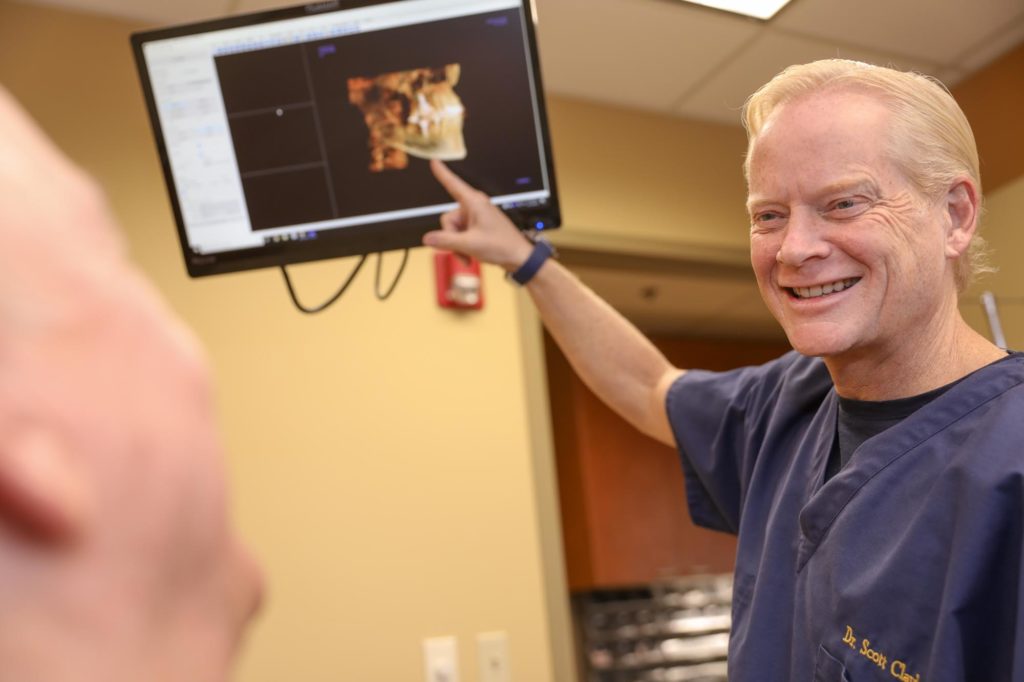
When administered and monitored by an anesthesia team led by a well-trained and highly skilled surgeon, such as Dr. Clayhold, all levels of sedation, up to and including general anesthesia, may be safely, comfortably and predictably provided to patients undergoing an office-based oral surgery procedure.
As with any surgery, however, it is essential that patients, as key members of their healthcare team, take an active role in their treatment choices and ask the following questions before selecting an oral surgery specialist and office for their procedure.
Any oral surgery procedure that requires general anesthesia is surgery and should be performed by a surgeon trained explicitly in its administration and use. Oral and maxillofacial surgeons complete a minimum 4-year, hospital-based residency following dental school, during which time they train alongside anesthesiology residents on the anesthesia service. Throughout their residency, they hone their anesthesia skills in both hospital and outpatient surgical settings. To enhance all his skills, Dr. Clayhold completed an additional year of hospital-based oral surgery fellowship and a second full additional year of hospital-based anesthesia fellowship. All of this is in addition to his 4 year oral and maxillofacial residency.
Dr. Clayhold’s team is comprised of the surgeon and two well-trained anesthesia assistants who have trained together and work cohesively together to continuously monitor the patient’s vital signs during and after surgery.
While anesthesia emergencies are rare, you can feel safe that our team works systematically together and regularly trains as a unit to respond and treat emergencies quickly and appropriately. Many of our assistants trained extensively to prepare for and complete the rigorous Dental Anesthesia Assistant National Certification Examination, offered and overseen by the American Association of Oral and Maxillofacial Surgeons (AAOMS). All of our staff are specifically trained and certified in Basic Life Support. Oral and maxillofacial surgeons maintain current Advanced Cardiac Life Support and Pediatric Advanced Life Support certifications.
Should an anesthesia emergency occur, it is vital that the oral surgery office has the necessary equipment and drugs immediately available for the surgeon’s use. Unlike dental offices that do not perform surgery regularly, oral and maxillofacial surgery offices are well provisioned to meet any unexpected situation. All oral and maxillofacial surgery offices undergo an biennial Office Anesthesia Evaluation to ensure the staff is trained to respond to emergency situations, the equipment is in excellent working condition, and that rescue drugs are current.
For your safety, patients should always tell their surgeon about:
• Healthcare concerns on the day of surgery, including flu-like symptoms, dizziness, etc.
• Chronic medical conditions, including diabetes, liver or kidney disease, and heart conditions.
• All the medications you take, including nonprescription drugs, nutritional supplements, and recreational drugs and their dosages.
• Whether they have had any food or water before surgery.

Address
22605 SE 56th Street, Suite 110 Issaquah, WA 98029
Current Patient:
(425) 369-1533
New Patient:
(425) 651-6532
Fax:
(425) 369-1536
Office Hours:
Tuesday: 7:00am – 4:00pm
Wednesday: 7:00am – 4:00pm
Thursday: 7:00am – 4:00pm
Friday: 7:00am – 2:00pm